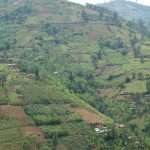What good democracy would do
The Al Jazeera reporter in Bujumbura this evening said it was felt that the coup in Burundi was probably the will of the people, that the country was one of the least urbanised in Africa and that the people in the rural areas had been so intimidated there could not have been fair and democratic elections. So intimidated, or simply so poor they had not the time or energy or resources to participate?
Driving out of Bujumbura one morning, it was hard to gauge how far we had travelled. There were no signposts, only occasional tarmac, and the odometer on the car did not work. There was a constant stream of humanity towards the city, people carrying produce, people heading to markets, people walking because walking was all they could afford to do. Beside one stretch of road, there was an area of open flat land, it was dry and the vegetation was dying. “This was good land worked by small farmers”, said the driver, “but a big man decided he wanted the river to run through his own land, so he diverted the river.” It was pointless to ask why the government had done nothing, this was one of the most corrupt places in the world.
What would elections have done for the community who had lost their land? Small farmers means perhaps a quarter of an acre of land, what hope had they against the big men who could buy whatever decisions they sought? There was no capacity in that community to ensure that democracy worked.
Communities are poor and many individuals are even poorer. One of the poorest countries on Earth, the income per capita is said to be US$260 per annum, US$5 per week per person. It is a statistic that hides the reality, there is a huge disparity of income, the greatest of which is between a tiny affluent urban elite and the rural poor. Accustomed to seeing better houses in villages that were built with concrete blocks and had tiled or corrugated iron roofs and might have two rooms, and poorer houses that were built with mud bricks and rush roofs, it was a shock to go to a village where there were people living in structures that were no more than shelters built with branches and leaves.
How are people living in a poverty beyond European imagination going to have a chance of meaningful participation in a democratic process? They might vote, but it would be for the man who made the biggest promises, promises that would be worth nothing when he gained power. They might vote, but the prospect of that vote being free or fair would be remote.
Disempowered communities and impoverished individuals are the stuff of everyday life. It is easy to travel along in a 4×4; pass through towns and villages of shanty houses; pass the roadside tides of people; pass the checkpoints where armed policemen assume the presence of a muzungu will mean a bribe will be paid; pass unfinished vanity projects half-built because most of the money from the Western donors has been siphoned off; pass constant, unrelenting grinding poverty; and step into an air-conditioned hotel where a room may cost more than a better one in Europe, where the menu is European and American, and where CNN brings a reminder of what the world is like for a few.
Without a capacity to organize, without the freedom to bring change, what hope is there for those people? But which Western power is going to stand up to the elite?
Sometimes, the question comes down to the fate of individuals.
Stepping out of a car into the heat of a Burundi morning, a child had made his way towards us. Both knees bent to the right and walking was a difficulty. His eyes were affected by a severe squint and it was difficult to know how easily he might focus.
Reaching out, he took the hand of my Burundian companion and then reached out for mine. He held tightly as we walked to a group of trees between which tarpaulins had been stretched to provide shade for a church service. At the end of the service, as the congregation dispersed, the boy came and stood beside my colleague, who took out his wallet and handed the boy a hundred franc note (worth about 5 cents). The boy headed off towards the road. “He likes to buy a doughnut after church.”
“Will he receive any education?”
“No. Look around you; look at this place. They have not even water. Do you think there are facilities where he might be educated?”
The question had been naive, stupid, crass.
Even without intimidation, Burundian elections would have done nothing for that boy. One rich man would have been replaced by another rich man and the elite would have continued, democratic it might have been, but it hardly builds democracy.
A good democracy would empower communities deprived of their natural resources, it would lift individuals out of destitution, it would care for small boys with disability.


Comments
What good democracy would do — No Comments
HTML tags allowed in your comment: <a href="" title=""> <abbr title=""> <acronym title=""> <b> <blockquote cite=""> <cite> <code> <del datetime=""> <em> <i> <q cite=""> <s> <strike> <strong>